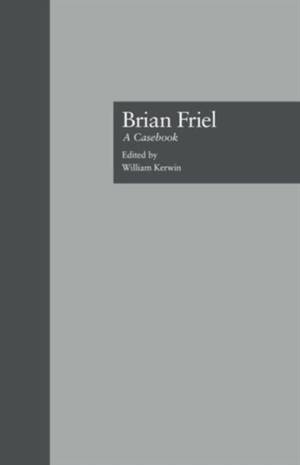
Bedankt voor het vertrouwen het afgelopen jaar! Om jou te bedanken bieden we GRATIS verzending (in België) aan op alles gedurende de hele maand januari.
- Afhalen na 1 uur in een winkel met voorraad
- In januari gratis thuislevering in België
- Ruim aanbod met 7 miljoen producten
Bedankt voor het vertrouwen het afgelopen jaar! Om jou te bedanken bieden we GRATIS verzending (in België) aan op alles gedurende de hele maand januari.
- Afhalen na 1 uur in een winkel met voorraad
- In januari gratis thuislevering in België
- Ruim aanbod met 7 miljoen producten
Zoeken
Omschrijving
This volume brings together thirteen essays interpreting the work of Ireland's most formidable and puzzling playwright. Brian Friel's work has earned renown on both sides of the Atlantic, and plays such as "Philadelphia, Here I Come!, Translations, "and "Dancing at" "Lugnasa" have been box office hits still produced to large audiences. But both these popular plays and other Friel works-including "The Freedom of the City, Volunteers, " and "Molly Sweeney"-have produced a variety of interpretations, evidence of the difficulty of defining Friel's art. Friel has been celebrated for his ability to capture feelings of loss and emotional pain, as well as for his portraits of complex political and historical conflicts. Because of his position as playwright of both the heart and the social world, as tragic and comic poet, and as someone who connects the Irish Renaissance of Joyce, Gregory, and Synge with the epistemological inquiries of post-modernism, Friel is an author who escapes easy classification
Confinement and freedom, politics and the human spirit, suspicion and beauty-Friel sets all of these oppositions in play. Friel greatest achievement, the one which will be intriguing audiences and readers long into the future, may be his refusal to allow us to choose between these too easy alternatives, as he depicts language's dual potential to destroy or nourish. In a period in which cultural debate often divides people over just such lines, and as humanism and cultural studies become warring turfs, Friel stands out because of his demands that we rethink our own definitions of cultural authority. This volume of essays demonstrates-especially in the different readings provided of "Dancing at Lughnasa"-that Friel's plays provide windows into a wide range of studies of Irish culture: the volume includes what can be given the short-hand titles of literary, feminist, philosophical, political, and historical analysis. The essays in the volume bring out different facets of this rich playwright. Index. Bibliography.
Confinement and freedom, politics and the human spirit, suspicion and beauty-Friel sets all of these oppositions in play. Friel greatest achievement, the one which will be intriguing audiences and readers long into the future, may be his refusal to allow us to choose between these too easy alternatives, as he depicts language's dual potential to destroy or nourish. In a period in which cultural debate often divides people over just such lines, and as humanism and cultural studies become warring turfs, Friel stands out because of his demands that we rethink our own definitions of cultural authority. This volume of essays demonstrates-especially in the different readings provided of "Dancing at Lughnasa"-that Friel's plays provide windows into a wide range of studies of Irish culture: the volume includes what can be given the short-hand titles of literary, feminist, philosophical, political, and historical analysis. The essays in the volume bring out different facets of this rich playwright. Index. Bibliography.
Specificaties
Betrokkenen
- Uitgeverij:
Inhoud
- Aantal bladzijden:
- 278
- Taal:
- Engels
- Reeks:
Eigenschappen
- Productcode (EAN):
- 9781138870512
- Verschijningsdatum:
- 27/02/2015
- Uitvoering:
- Paperback
- Formaat:
- Trade paperback (VS)
- Afmetingen:
- 140 mm x 216 mm
- Gewicht:
- 326 g

Alleen bij Standaard Boekhandel
+ 119 punten op je klantenkaart van Standaard Boekhandel
Beoordelingen
We publiceren alleen reviews die voldoen aan de voorwaarden voor reviews. Bekijk onze voorwaarden voor reviews.








